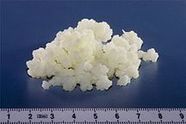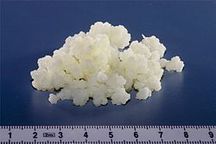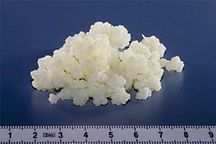If you know me, you know I am a huge fan of milk kefir. Unfortunately, there are still many of you that don't know what kefir is or how this simple fermented drink could change your life. I am lactose intolerant, and had bloating, gas, indigestion so bad I have even gone to the Emergency Room thinking I am having a heart attack. I know what you are thinking… Why would I drink milk kefir if I am lactose intolerant since Kefir is a milk product. True, kefir is traditionally a milk product, but it is a fermented milk product and that fermentation changes the chemical composition of foods? Kefir’s low lactose content may actually make it possible to improve lactose intolerance.
I now drink kefir at every meal, and do not suffer any longer from digestive issues. It has also helped my lactose intolerance issue, I can eat some ice cream without suffering from the bloating and pain. I saw this article written by Shantha Kalia and could not of done a better job talking about the benefits of kefir.
What is kefir?
Kefir is a fermented product that originated in the Caucasus. It gets its name from the Turkish word ‘keif,’ which means ‘good feeling.’ Kefir is a unique cultured dairy product due to the combination of lactic acid and the alcoholic fermentation of lactose.
What distinguishes it from the traditional fermented milk product (yogurt) is that it's made from kefir grains, which are basically a symbiotic community of bacteria and yeasts. The kefir grains – or the microorganisms – are held together by a polysaccharide matrix, called kefiran. Kefir grains produce kefir by their microbial activity. The symbiotic relationship of the microbes results in a relatively stable and specific balance of bacteria and yeast. Kefir grains were passed from generation to generation among the tribes of the Caucasus.
This probiotic food contains several health benefits. It has antibacterial, antifungal and anti-carcinogenic properties. It is known to not only reduce symptoms of lactose intolerance, but also known to lower cholesterol and stimulate the immune system. Probiotics – which kefir contains in abundance – are known to improve gastrointestinal health by maintaining healthy gut bacteria.
Nutrition Facts
Kefir contains high concentrations of vitamin B12, calcium, magnesium, vitamin K2, biotin, folate, protein, enzymes and probiotics. These unique set of nutrients benefit the body in many ways.
Here are 5 main reasons you should be drinking kefir, even if you are lactose intolerant.
1. Improves Lactose Intolerance:
Fermentation changes the chemical composition of dairy products like milk, rendering it relatively low in lactose. An enzyme, β-galactosidase – which is essential to digest lactose – is present in the microbes in the fermented milk, according to researchers at Ohio State University who published their results in the Journal of the American Dietetic Association. Some bacterial cells die in the intestinal tract and release the enzymes that digest the lactose. It is suggested that microbes in kefir may be able to colonize the intestines and benefit health by shielding them from harmful disease-causing bacteria.
TIP: If you struggle with lactose problems, try adding kefir to your diet in small amounts to see how well you tolerate it.
2. Provides benefits for the digestive system:
Kefir contains viable microorganisms (lactobacillus and bifidobacterium) that inhabit and colonize the digestive system, protecting it from diseases such as leaky gut, irritable bowel syndrome and inflammatory bowel disease. Kefir improves digestion, alleviates some common digestive problems like gas, bloating, indigestion, etc. It promotes regular bowel movements and has a stimulatory effect on the motor and emptying function of the stomach. Milk, milk whey, cheese and butter have an inhibitory effect on this function. Russian physicians have successfully used kefir to treat peptic ulcers in the stomach and duodenum.
3. Boosts immunity:
Kefir has a stimulating effect on the immune system and improves its disease-fighting capacity. Nearly 70% of your immune system resides in your gut. Kefir is able to modify the balance of the immune cells in the intestinal mucosa. When your immune system is functioning normally, it usually controls bacteria and yeast in the body to prevent infections. Certain medications you may be taking can decrease your body’s immunity and therefore, increase your chances of getting sick from bacteria and yeast. Kefir is an excellent source of nourishment for the elderly, pregnant and nursing women, kids and those who are immunocompromised.
4. Anticarcinogenic properties:
The anti-cancer property of kefir is thought to have originated in the polysaccharide content of kefir grains. Kefir benefits cell damaged by radiation treatment. When pelvic malignancies are treated with radiotherapy, stem cells in the crypts of the intestine are destroyed. However, intake of kefir has shown to decrease the damage by protecting the colonic cells.
5. Antimicrobial properties:
Antimicrobial activity in kefir is associated with the production of lactic acid, carbon dioxide and ethanol. These compounds not only reduce the food borne pathogen in your body, but also aid in the treatment and prevention of gastroenteritis and vaginal infections. Kefir acts against pathogenic bacteria Salmonella, Helicobacter, Shigella, Staphylococcus, E. coli, Proteus vulgaris, etc.
Kefir is available at Walmart and most health food stores, but it's not the same as what you make fresh at home. If you want all the health benefits go to Amazon on line and order "LIVE KEFIR GRAINS". The grains are not expensive and once you have them, you have them for life. On line many places sell dried kefir grains which make it easier to ship but some of the micro organisms have been killed due to the drying process, do not buy the dried grains.
If you have any questions email me or stop by at the Farmer's Market and I will be happy to share what ever I know about this wonderful drink.
Tamara
I now drink kefir at every meal, and do not suffer any longer from digestive issues. It has also helped my lactose intolerance issue, I can eat some ice cream without suffering from the bloating and pain. I saw this article written by Shantha Kalia and could not of done a better job talking about the benefits of kefir.
What is kefir?
Kefir is a fermented product that originated in the Caucasus. It gets its name from the Turkish word ‘keif,’ which means ‘good feeling.’ Kefir is a unique cultured dairy product due to the combination of lactic acid and the alcoholic fermentation of lactose.
What distinguishes it from the traditional fermented milk product (yogurt) is that it's made from kefir grains, which are basically a symbiotic community of bacteria and yeasts. The kefir grains – or the microorganisms – are held together by a polysaccharide matrix, called kefiran. Kefir grains produce kefir by their microbial activity. The symbiotic relationship of the microbes results in a relatively stable and specific balance of bacteria and yeast. Kefir grains were passed from generation to generation among the tribes of the Caucasus.
This probiotic food contains several health benefits. It has antibacterial, antifungal and anti-carcinogenic properties. It is known to not only reduce symptoms of lactose intolerance, but also known to lower cholesterol and stimulate the immune system. Probiotics – which kefir contains in abundance – are known to improve gastrointestinal health by maintaining healthy gut bacteria.
Nutrition Facts
Kefir contains high concentrations of vitamin B12, calcium, magnesium, vitamin K2, biotin, folate, protein, enzymes and probiotics. These unique set of nutrients benefit the body in many ways.
Here are 5 main reasons you should be drinking kefir, even if you are lactose intolerant.
1. Improves Lactose Intolerance:
Fermentation changes the chemical composition of dairy products like milk, rendering it relatively low in lactose. An enzyme, β-galactosidase – which is essential to digest lactose – is present in the microbes in the fermented milk, according to researchers at Ohio State University who published their results in the Journal of the American Dietetic Association. Some bacterial cells die in the intestinal tract and release the enzymes that digest the lactose. It is suggested that microbes in kefir may be able to colonize the intestines and benefit health by shielding them from harmful disease-causing bacteria.
TIP: If you struggle with lactose problems, try adding kefir to your diet in small amounts to see how well you tolerate it.
2. Provides benefits for the digestive system:
Kefir contains viable microorganisms (lactobacillus and bifidobacterium) that inhabit and colonize the digestive system, protecting it from diseases such as leaky gut, irritable bowel syndrome and inflammatory bowel disease. Kefir improves digestion, alleviates some common digestive problems like gas, bloating, indigestion, etc. It promotes regular bowel movements and has a stimulatory effect on the motor and emptying function of the stomach. Milk, milk whey, cheese and butter have an inhibitory effect on this function. Russian physicians have successfully used kefir to treat peptic ulcers in the stomach and duodenum.
3. Boosts immunity:
Kefir has a stimulating effect on the immune system and improves its disease-fighting capacity. Nearly 70% of your immune system resides in your gut. Kefir is able to modify the balance of the immune cells in the intestinal mucosa. When your immune system is functioning normally, it usually controls bacteria and yeast in the body to prevent infections. Certain medications you may be taking can decrease your body’s immunity and therefore, increase your chances of getting sick from bacteria and yeast. Kefir is an excellent source of nourishment for the elderly, pregnant and nursing women, kids and those who are immunocompromised.
4. Anticarcinogenic properties:
The anti-cancer property of kefir is thought to have originated in the polysaccharide content of kefir grains. Kefir benefits cell damaged by radiation treatment. When pelvic malignancies are treated with radiotherapy, stem cells in the crypts of the intestine are destroyed. However, intake of kefir has shown to decrease the damage by protecting the colonic cells.
5. Antimicrobial properties:
Antimicrobial activity in kefir is associated with the production of lactic acid, carbon dioxide and ethanol. These compounds not only reduce the food borne pathogen in your body, but also aid in the treatment and prevention of gastroenteritis and vaginal infections. Kefir acts against pathogenic bacteria Salmonella, Helicobacter, Shigella, Staphylococcus, E. coli, Proteus vulgaris, etc.
Kefir is available at Walmart and most health food stores, but it's not the same as what you make fresh at home. If you want all the health benefits go to Amazon on line and order "LIVE KEFIR GRAINS". The grains are not expensive and once you have them, you have them for life. On line many places sell dried kefir grains which make it easier to ship but some of the micro organisms have been killed due to the drying process, do not buy the dried grains.
If you have any questions email me or stop by at the Farmer's Market and I will be happy to share what ever I know about this wonderful drink.
Tamara



 RSS Feed
RSS Feed
